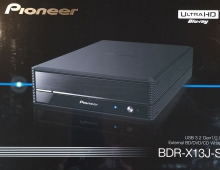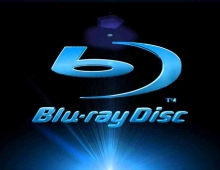
Blu-ray burns for interactive content
The next generation in DVD technology will let consumers carry the equivalent of a hard drive on a disc, but what are they supposed to do with all that capacity? Interact, supporters say.
Manufacturers fancy a reciprocal relationship in which a consumer, before watching a Spider-Man movie in high-definition video on DVD, downloads and stores on the rewritable portion of that same disc a video game or trailer for the next Spider-Man sequel. The consumer would also be able to update those games and previews as new versions come out--and give studios the opportunity to make more direct pitches. That's the vision for Blu-ray Discs and broadband-connected recorders that Blu-ray backers described in a recent press tour.
Whether interactive features will have consumers swinging into retail stores to buy the recorders is something that only time will tell, but for the moment, such features are currently more a means to an end--attracting studio support to the Blu-ray Disc format. Hollywood's backing could push Blu-ray to victory in the competition to be the high-definition DVD standard.
Adding interactive features "is a major focus of the application development effort," said Richard Doherty, a spokesman for Blu-ray Disc and a director at Panasonic. "It's something of great interest to all studios...The goal is to have them ready from the get-go in the first (Blu-ray Disc movie) titles."
By appealing to entertainment studios, Blu-ray Disc supporters are trying to get a leg up on a competing format, HD DVD. Allying with partners who could bestow their libraries of commercial entertainment content on the Blue-ray format would also significantly aid backers' efforts to make next-generation recorders a mass market product. Blu-ray Disc and HD DVD are vying to take the home entertainment baton from DVD, which has been one of the fastest-growing categories in consumer electronics history.
But one of these formats may have to be the Betamax, falling into obscurity as the other goes on to VHS-level dominance.
"Obviously, it is in everyone's best interest to have one (next-generation DVD) format," Craig Kornblau, president of Universal Studios Home Video, said in a statement. "We are in the process of evaluating the (specifications), and we haven't made any decisions yet."
The Blu-ray Disc and HD DVD formats offer much higher capacity in a disc than today's DVDs, which hold up to 8.5GB on a dual-layer disc. With as much as 50GB per dual-layer Blu-ray Disc, next-generation DVDs will be a fairly cheap form of optical storage. The formats are somewhat similar but incompatible fragmenting the market and slowing development. Blu-ray Disc and HD DVD use blue lasers, which have shorter wavelengths than the red lasers in today's DVD players and both plan to be compatible with current DVD technology.
On paper, the Blu-ray Disc camp seems to have more friends than HD DVD, whose principle backers are NEC and Toshiba. Blu-ray's champions include Sony, Matsushita Electric Industrial (Panasonic's parent), Royal Philips Electronics, Samsung Electronics, Hewlett-Packard and Dell. But apparently you can never have too many friends--Both groups are courting the studios.
On a grander scale, these newer DVD technologies are part of a larger cross-industry effort to untether digital content from specific consumer electronics products. Digital content isn't limited to one physical medium, such as a cassette tape, and can be easily transferred from device to device--an MP3 file can go from desktop to portable audio player to laptop. That flexibility can let consumers enjoy digital content in new and more convenient ways. However, content companies have been cautious of this new dynamic because of piracy concerns, and have even sued file-sharing consumers. Still, many expect the entertainment industry to sell its content on next-generation DVD discs, just as it has been VHS and DVDs.
Already, a group of high-profile technology companies and movie studios have created a new copy protection standard for next-generation DVDs that could allow high-definition movies to be copied and used in home networks. At least one proponent of each format has joined the new copy protection effort to meet Hollywood's digital rights management concerns. Clearing this hurdle could prepare next-generation DVD to be the sequel to the runaway hit its predecessor has been.
Taking the DVD baton
Shipments of DVD players have been very healthy and shipments are projected to hit 110 million units. But it's a wave that has crested.
"DVD player shipments are close to a peak, and then they'll drop like a rock, like VCRs," said iSuppli analyst Shyam Nagrani.
Sales of DVD recorders are beginning to swell in the players' wake. Last year, about 4 million units were shipped, and by 2008 that figure will jump to 65 million, according to iSuppli. Nagrani said shipments of next-generation DVD recorders will likely mimic those of DVD recorders, but lag behind them by five years.
Aiding sales of next-generation DVD recorders will be shipments of high-definition televisions and the rollout of high-definition content to be used with those sets. About 17 million sets are expected to ship this year, and 77 million by 2008. Users who record high-definition TV will play into the hands of Blu-ray Disc and HD DVD--the high storage demands of such shows will be too large for current DVDs.
As more televisions and content become available in high definition, Wolfgang Schlichting, an analyst with research firm IDC, expects that most of the Hollywood studios will publicly pledge their support for one or the other format by 2006. The entertainment industry knows that multiple technologies could slow consumer adoption and lead to higher inventory costs--every movie would have to be stamped out in every viable format.
Hollywood muscle
Studios, which crowned the VHS format king in the early 1980s, are no strangers to a battle over formats. They know that the backing of the content makers will play a large role in the success of any next-generation DVD technology.
"The majority of DVD revenue comes from prepackaged media from Hollywood, it was a big deal for DVD and VHS and we expect it to be a big deal for Blu-ray," Doherty said. "Studios are a key player in the whole business."
Still, manufacturers recognize the significance of content--and its owners. They continue to call on Hollywood, even integrating more features than consumers may want.
HD DVD also can include interactive features, but those capabilities haven't been pinned down, said Hisashi Yamada, Chief Fellow of Technology of Toshiba's Digital Media Network Company. Ross Rubin, an analyst with NPD Techworld, says the studios have been paying attention to the value of features.
"Hollywood has been pleased by the interactive menus," he said. "If (the menus) are there, consumers might use them, but really, they will be drawn to better picture quality."
Interactive features draw studios closer to consumers, allowing them to market and get feedback from viewers more immediately, but it's a careful balance. Hollywood could fear that such features may even turn consumers off, Schlichting said.
"In some cases, they can be annoying," he said. "Most of the mainstream consumers just want to see the movie."
Doherty agreed that studios and manufacturers will have to be careful which interactive features make it to consumers. But in the development phase, they're trying everything.
"The market will decide what interactive features to keep," Doherty said. "Our intent is to give a wide palette to the authors to design whatever they want."
From NEWS.com





















